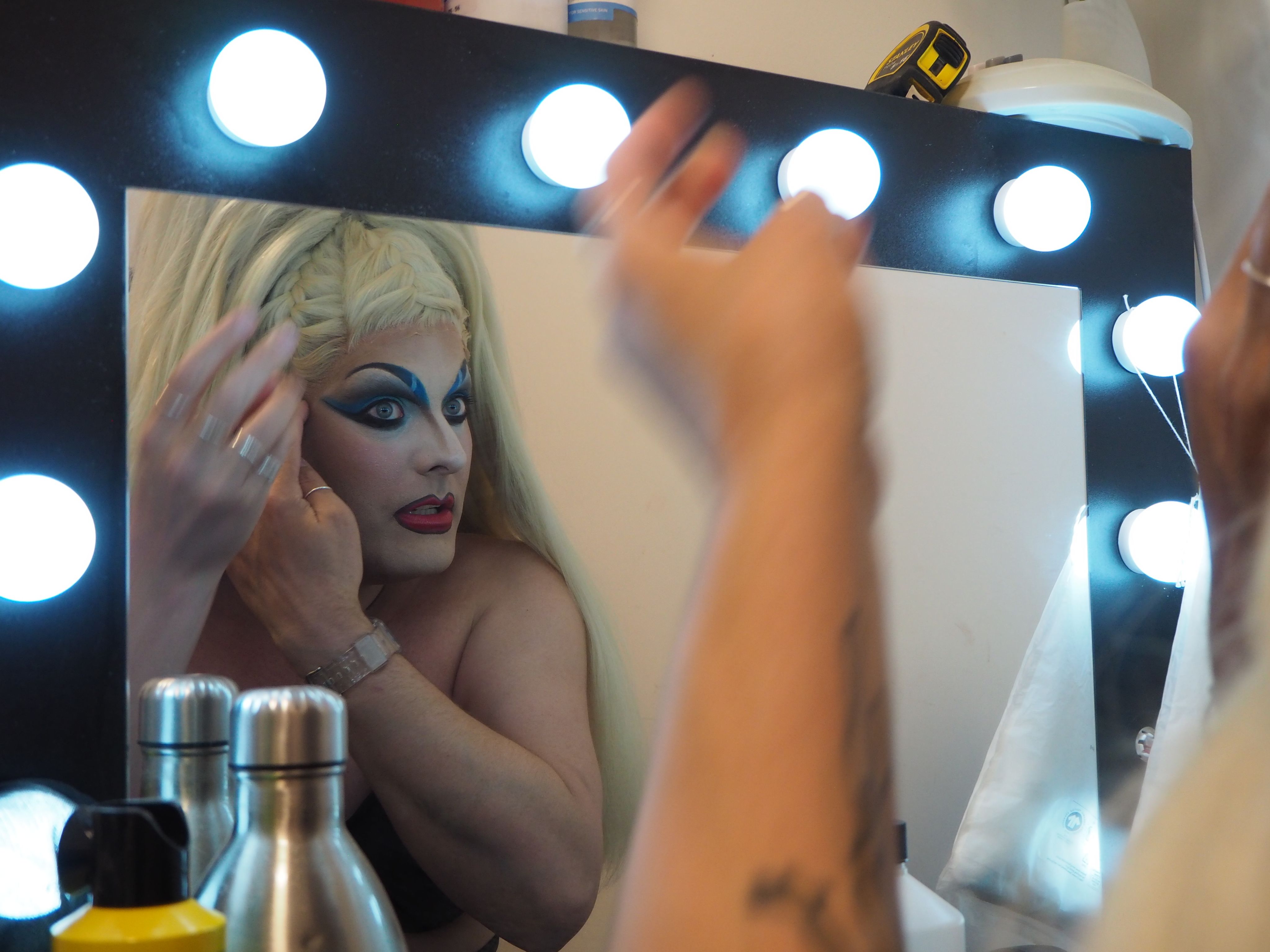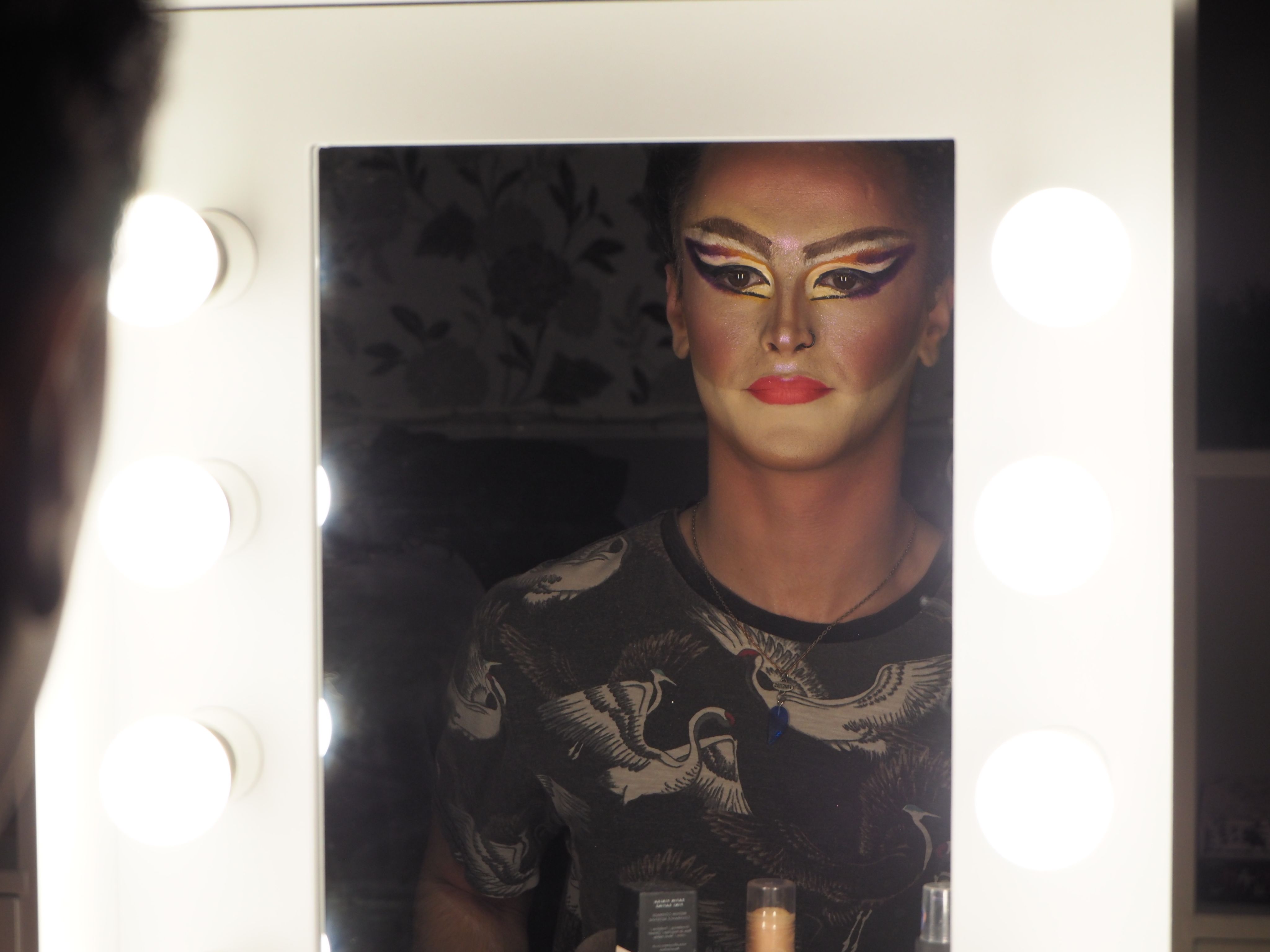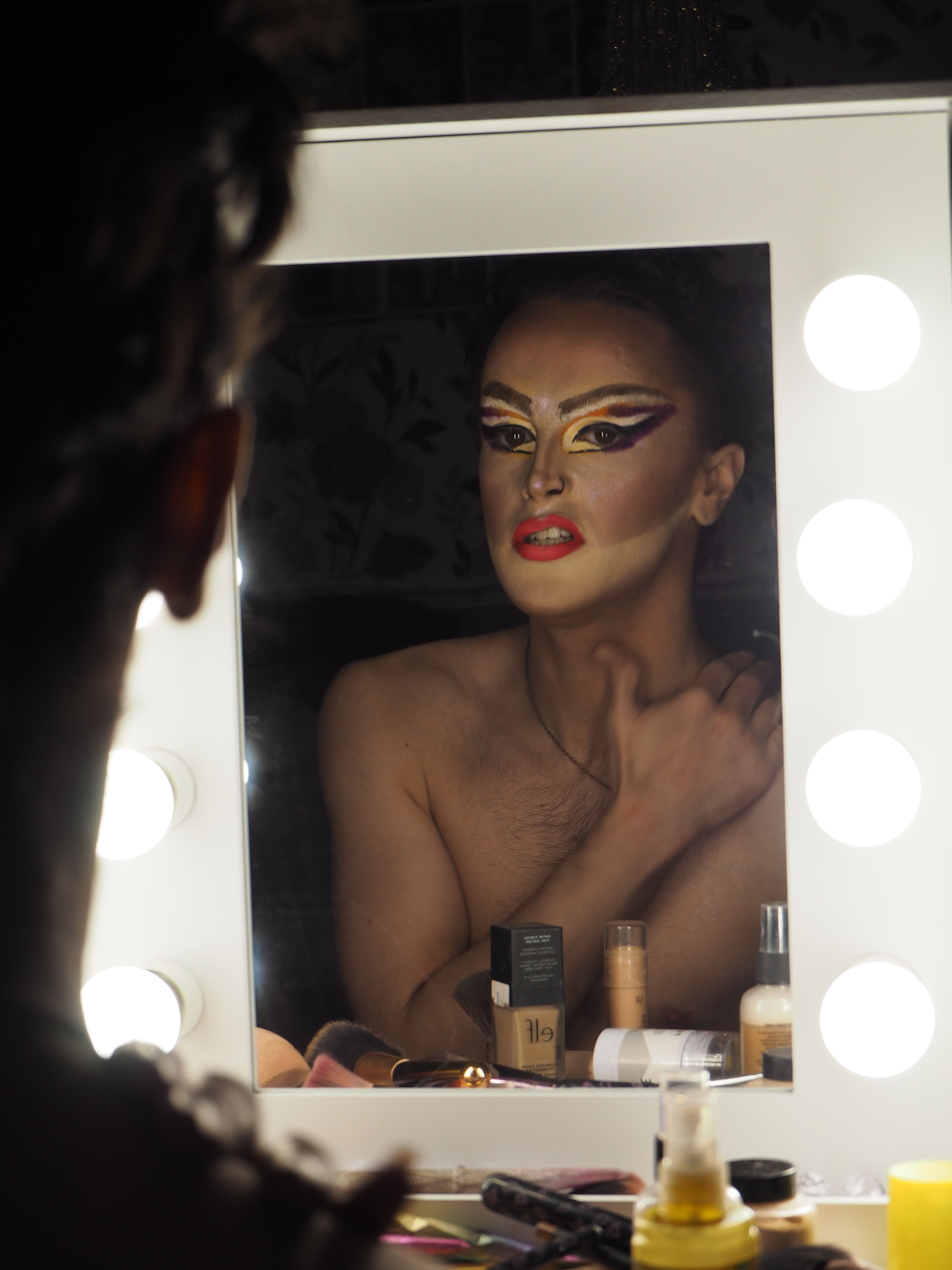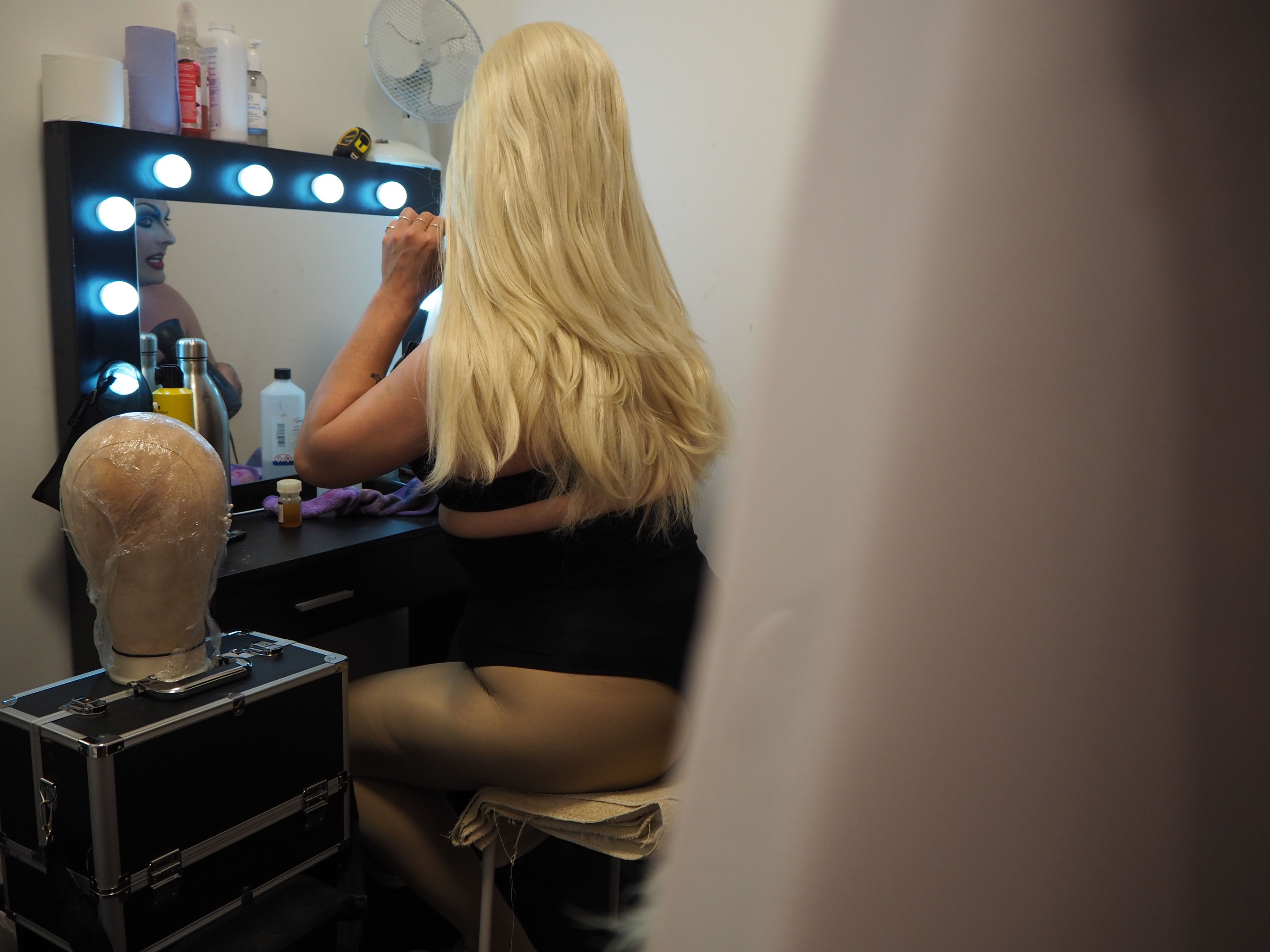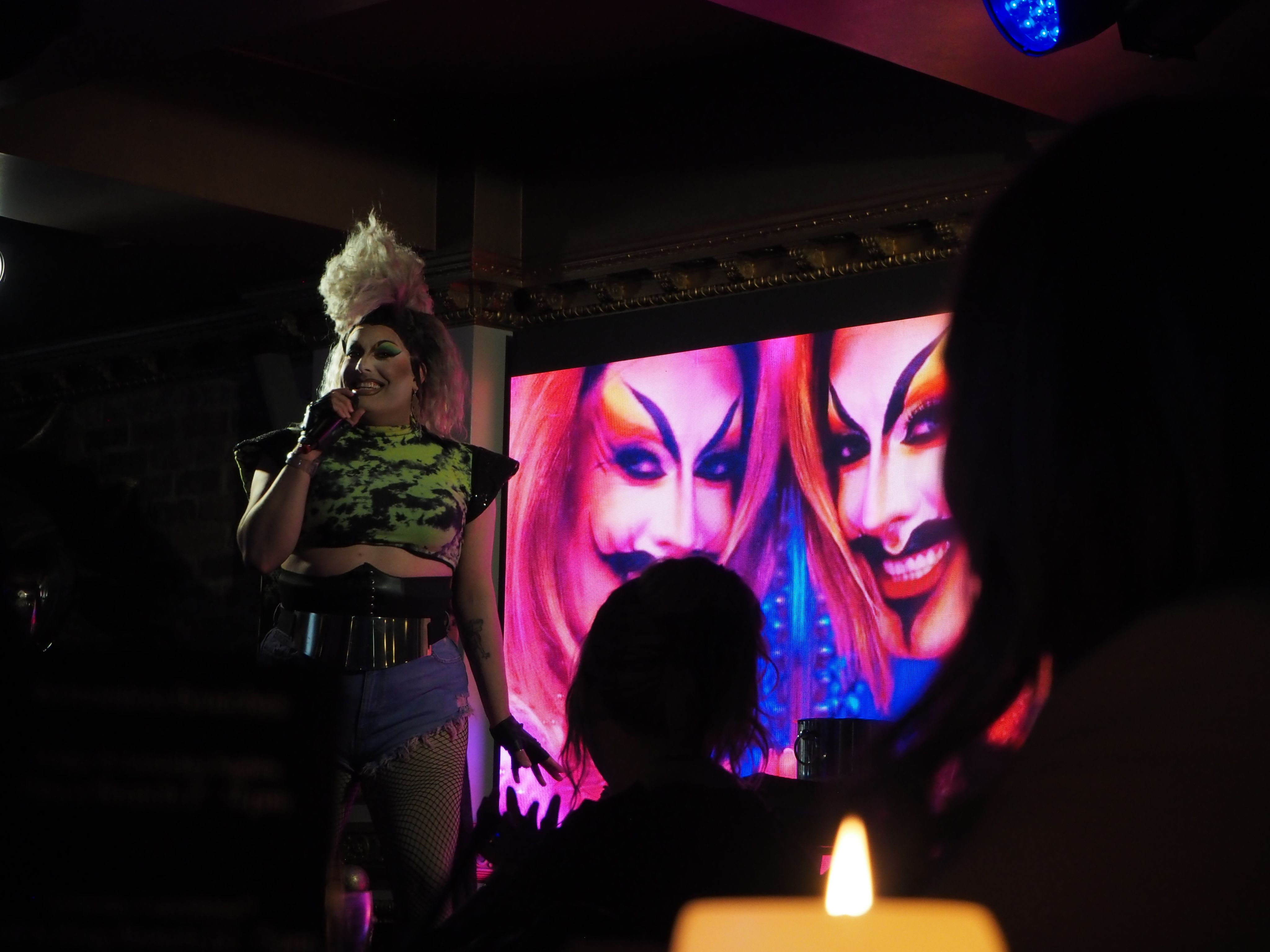The Cost of
The Crown
The True Price of Drag in Modern Britain
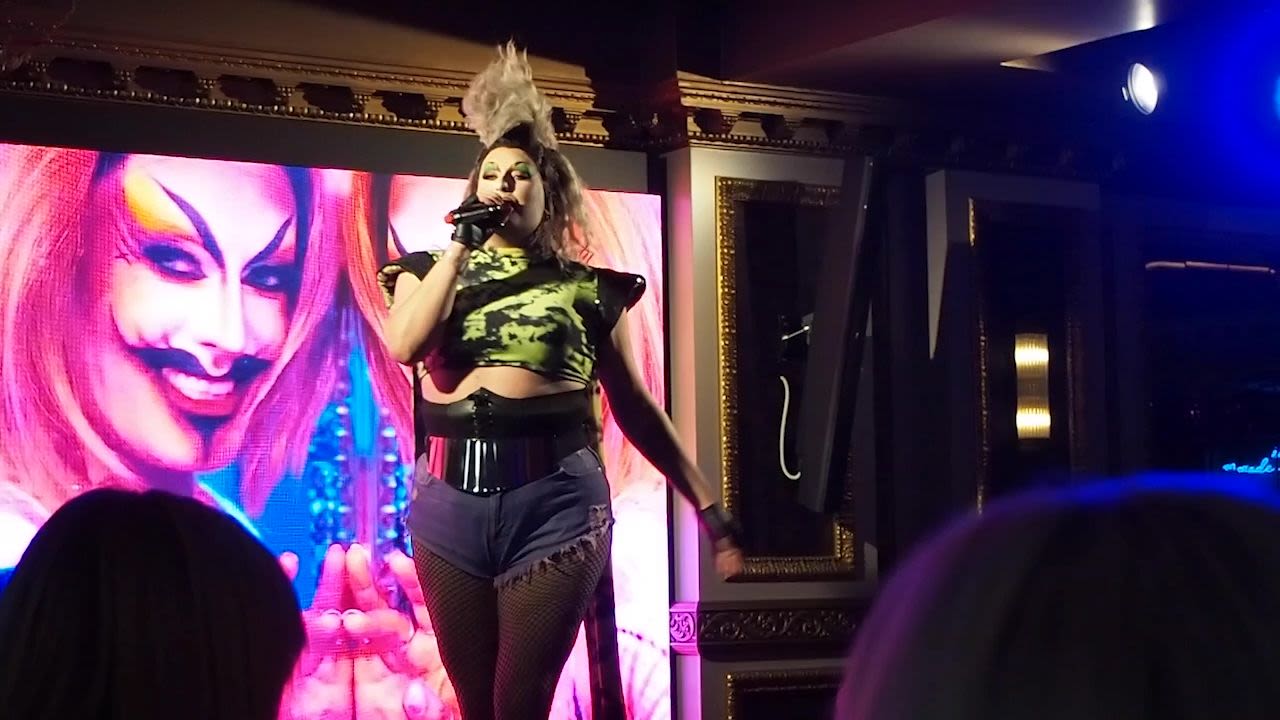
What is the cost of the crown?
If we are talking about the Crown Jewel that Queen Elizabeth II used to wear, various sources mention its worth to be £3 billion to £5 billion. If we are talking about drag queens, their crown comes at a steep price. For some, bearing the crown means cutting ties with families and friends, bidding farewell to the big city because the gangs aren't satisfied with just making you a punching bag – they threaten your entire family too. You're left hoping your Father never finds out you're still breathing. But through it all, you shed your old skin and unfurl a new persona – someone that feels familiar yet far more resilient. Someone who has what it takes to wear the crown.
In modern Britain, these costs are routine banalities. The pressure has only multiplied with the surging hate crimes, the immense backlash and politicisation to drag queens who tell stories to children in public libraries, additional tension by the rising cost of living that threatens their safe space, whilst constantly expected to follow the standardised, high-maintenance look following the success of RuPaul's Drag Race.
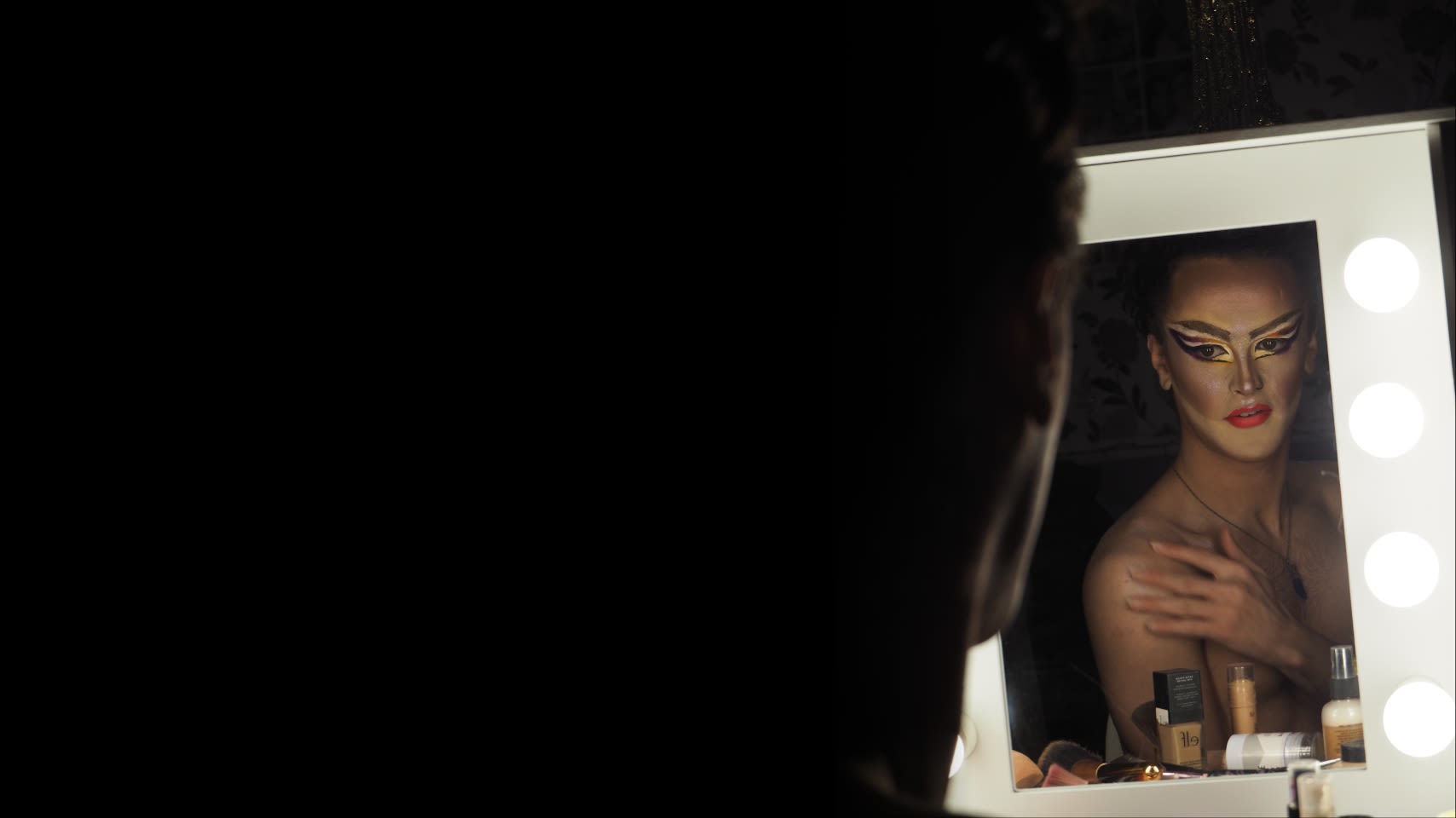
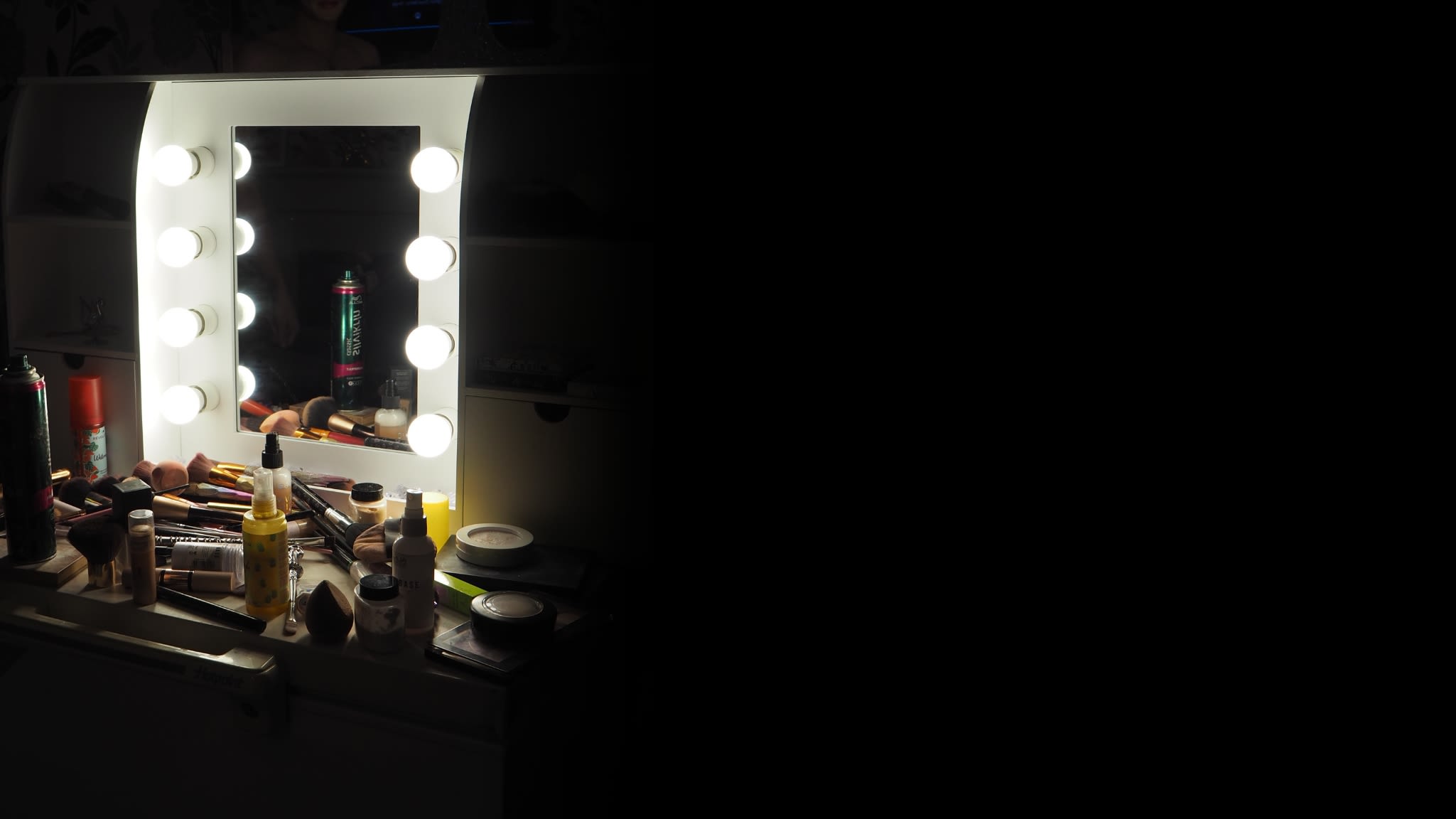
It is true that we have seen growing acceptance of drag queens thanks to RuPaul's Drag Race. Yet, it is also true that many members of the LGBTQ+ community, including drag queens, continue to face pervasive animosity. Recent years have shown a surge in hate crimes, as well as heated debates over their place and representation in society. This has been particularly evident in the ongoing controversy surrounding Drag Queen Story Hour events, which have sparked protests and counter-protests across the country. The challenge to wear the crown in modern Britain doesn’t stop there. They also have to face the rising cost of living that has significantly affected the community. For one, it has made it more difficult to find a job as contract cancellation has become common, and harder to afford costumes and makeup that fits the growing – and uniformed – audience expectation. The pressure to conform to sky-high beauty standards set by none other than RuPaul's Drag Race. RuPaul's Drag Race is a US reality competition TV show that features drag queens competing in challenges every week, and the UK version premiered in 2019 on BBC Three. The show has transformed the UK drag scene, altering both the audience vibe and the safety of drag queens' spaces.
Just like layers of their makeup, each element of their struggle deserves its own spotlight. Let’s talk about The Cost of The Crown.
The Price of Prejudice
The Rise of Anti-Drag Sentiment
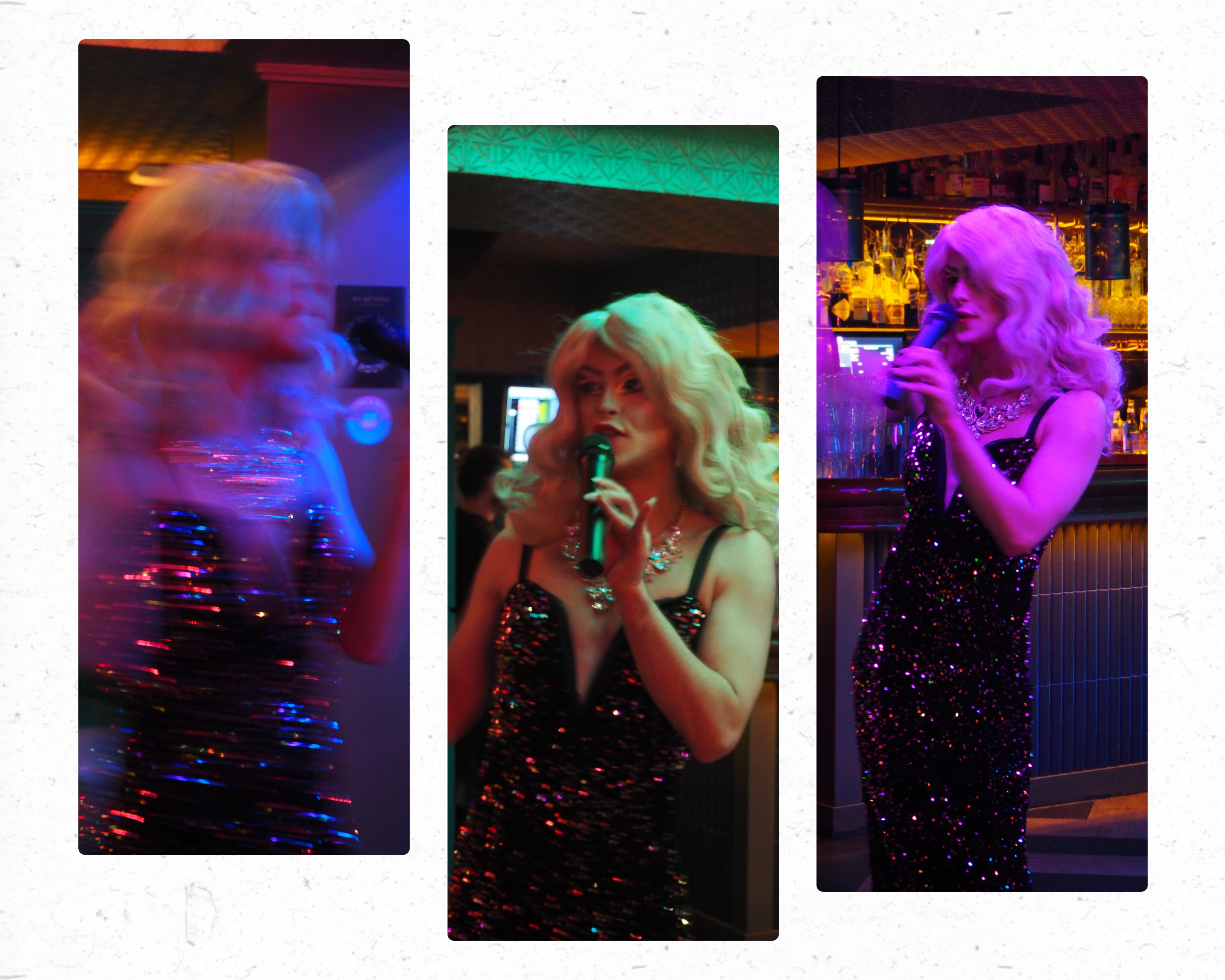
There is no single, universal reason why people might hate drag queens or LGBTQ+ community, yet we know what it costs: incurable scars. The hate could come from anyone; neighbours, friends, strangers, audience, a gang, or your own parents.
Danny Smith, their Mum and Sister moved from East London to Bournemouth eight years ago. London was very hard on Smith. It was a series of dreadful memories of the ‘tumultuous relationship’ with their Dad because of Smith’s ‘feminine character’, and a gang who always bullied them, threatened to kill their Mum and Sister and then put Smith in a coma. Smith was only 16.
Moving down to the south coast, the 21-year-old loves Bournemouth, hoping that Bournemouth would love them back. Bournemouth does, in some ways. They make friends, meet their drag sisters, live contently in a small two-story house with their Mum and their Mum’s best friend – who recently won £1,000 from bingo and bought a fancy grill for them to use over the summer – and found more opportunities as a newbie drag.
Sadly, in some other ways, Bournemouth reminds Smith that there are still people out there who are just addicted to hate.
“I could stop being feminine and just hate everything about myself, or I could keep being me, even more so than ever, and prove those people wrong. Show them that you can hurt me all you want, but I'm still gonna live my life.”
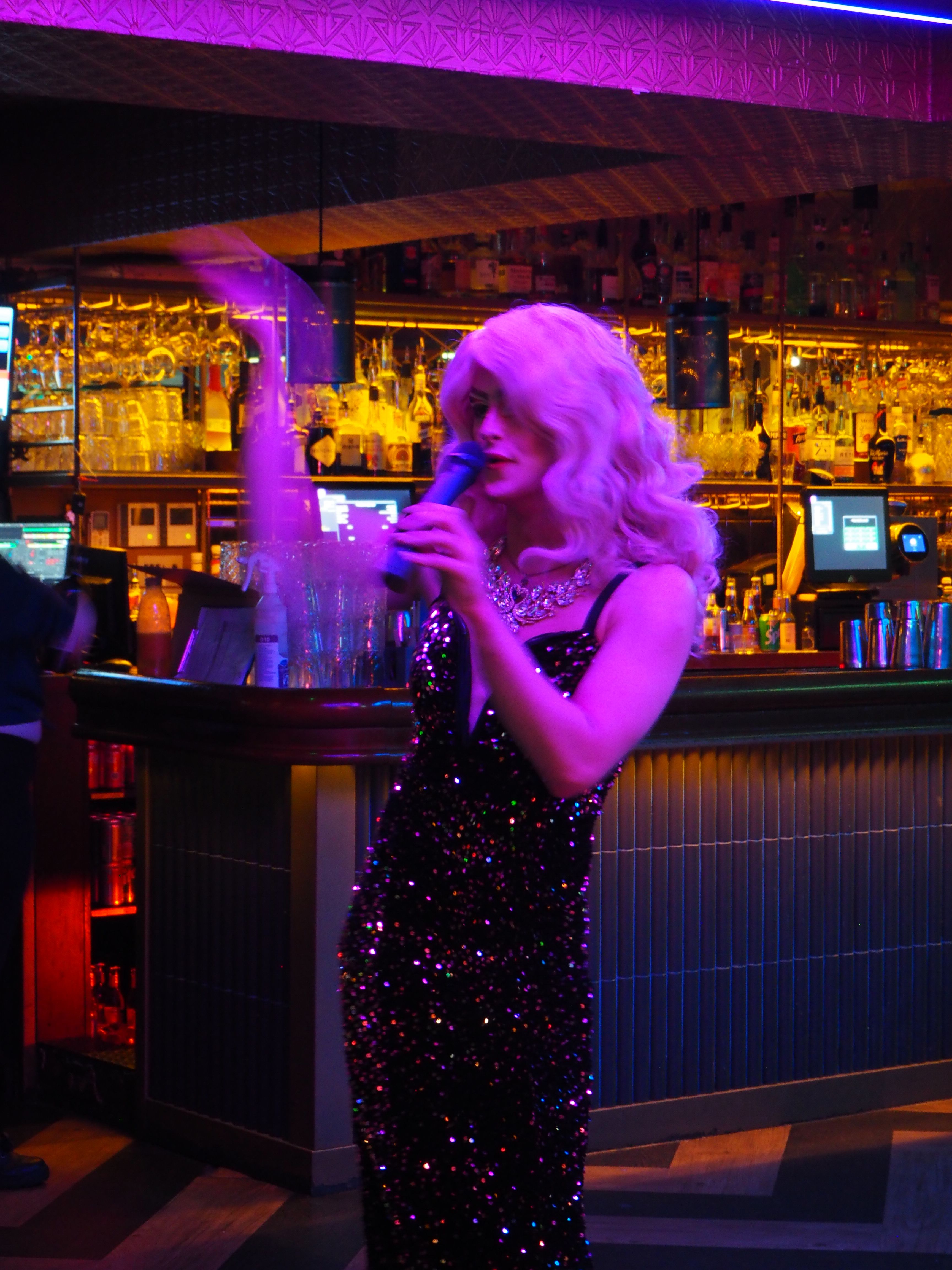
Hate crimes driven by sexual orientation increased by 27% in Dorset, from 157 in 2020–21 to 199 in 2021–22. In 2021, only 24 of the 160 sexual orientation hate crimes that Dorset Police had documented, had resulted in a charge or summons at the time the Freedom of Information request was made by RADAR. In 2022, Home Office figures show 1,102 hate crimes were recorded by Dorset Police in the year to March – an 8 per cent increase from the year before.
On early March 2023, teenagers assaulted a drag performer in Bournemouth town centre, telling him, "I'll put you in a wheelchair for life," because he was holding hands with his husband.
Elektra Fence, a participant of the third season RuPaul’s Drag Race UK, claimed to have been attacked by a group of nine individuals on an Avanti West Coast train traveling from London Euston to Manchester Piccadilly on 24 April 2022. According to Elektra, one of the men 'jumped out of her’ and she screamed. As she passed by, the group continued to insult her with various homophobic remarks. Despite ignoring them and moving away, she was later grabbed by one of the men and was pushed on top of him. The man then opened her jacket while other members of the group touched her in an ‘aggressive and intimidating manner’. In 2021, a string of assaults happened in a short span in Edinburgh, Birmingham, Liverpool, and London.
“So, what we're seeing unfortunately year on year is hate crime going up. Some people will say it's because it's easier to report. Some people will say it's because people are getting braver and maybe reporting more, so it might be more visible […] And I think from the national point of view, I think the outcry against Brianna was twofold on hate crimes and knives crime,” says Chris Ashton, chair of Bourne Free, a non-profit organisation that was established in 2004 in response to a far-right group planning to visit Bournemouth and spread anti-homosexual messages. They are also responsible for hosting the annual Pride event in Bournemouth each year.
Bourne Free stood united with around 300 people who attended the vigil honouring Brianna Ghey last February in Bournemouth Triangle. Ghey, a 16-year-old transgender who lived in Birchwood, Warrington, was found by members of the public with stab wounds as she lay dying on a path in Culcheth Linear Park on Saturday, 11 February. Brianna was murdered by a boy and a girl who are both aged 15.
“We interact a lot with gay, lesbian, bisexual teenagers or kids and transgender kids, and they are seeing hate crimes every day. They are getting bullied at school, getting names shouted at them. They’re still finding it confusing when they’re coming out. We also help Over The Rainbow to set up a rape crisis, because unfortunately with hate crime, we’re seeing increase of rapes […] I probably get a new story every month from someone who has received hate crimes.”
Ashton revealed that he too had been attacked because of his sexual orientation.
“I got beaten up in 2003. I was working in a bar in town called Bar Med, which is now Mary Shelley, and I was walking home one night by myself and got beaten up by two guys. They called me f*g and homosexual. Luckily for me, it was outside a nightclub, so security came over and intervened. But I had to go to the hospital. Had a black eye, a broken rib. It wasn’t a nice experience.”
“For us, there has been quite a lot of rhetoric at the moment from the politicians, which isn’t helping. I think there’s a misunderstanding of what LGBTQ+ people are looking for. We’ve never said we want more rights than anyone else. We kind of want equal rights, but equal rights are not having to talk about it and not being scared when you go out in the [Bournemouth] High Street.”
Latest data showing hate crimes against the LGBTQ+ community surge massively in the UK. According to a new official report, hate crimes related to sexual orientation and transgender identity have increased by 41% and 56% respectively between March 2021 and March 2022.
In June 2021 alone, nearly 400 homophobic attacks were recorded by the Metropolitan Police in London, representing the worst month on record for anti LGBTQ+ hate crimes since April 2011.
“We need to make sure we’re educating people to stop that happening. And what's worrying for me is I think there's a perception that it's about an older generation – it’s not necessarily just about an older generation. I still think there's more to do with kids today than what we're probably doing. And I think one of the big things is some of the rules that have come in about what we can and can't teach in school,” Ashton adds.
Ashton's goal aligns with that of drag queens and other gender-bending performers, such as pantomime dames, who are working to counteract this prejudice with events like Drag Queen Story Hour. The idea behind these events is drag or cross gender performers read children's books that promote acceptance and diversity. However, when Smith refers to the recent protests against drag queens, some of the demonstrations are centred around the storytelling event. Protesters are making allegations against drag queens, labelling them as "groomers" and "pedophiles".
Drag Story Hour: A Heated Hate
Heatwave was only one part in a series of unfortunate events that the UK experienced in summer 2022, as the ‘hatewave’ for Drag Queen Story Hour had only just begun. Widespread protests against the Drag Queen Story Hour, which was conducted by Sab Samuel aka Aida H Dee – the UK pioneering drag queen who conducts story time sessions for children in libraries – started in spring, February 11th. In front of the Tate Britain art gallery in London, protesters held signs that read: “No drag for kids!” and “Leave our kids alone!”, whilst a separate group of demonstrators, led by Stand Up To Racism, also gathered outside the gallery as counter-protesters.
In Bexleyheath and Reading, far-right and conspiracy theorist groups, identifying themselves as "sovereign citizens," displayed signs that read "Welcome groomers" and "Nonce upon a time" outside libraries. During the event in Reading, demonstrators asserted that Samuel's performance was "sexualising their children". Around 25 protesters were present, and two protesters storm in and disrupted the session.
When asked why Samuel wanted to do Drag Queen Story Hour, he explained that he did not have role models he could relate to as a child. He was disappointed that he just found out that Alan Turing was a gay man when he was older. Samuel believes that he can be a role model for children who feel like he did, and after performing a reading in drag for the first time, realised that it was necessary for children who lack representation. He is also diagnosed with autism and ADHD – hence his stage name – and found it really hard to ‘stay still’ during a conventional story time.
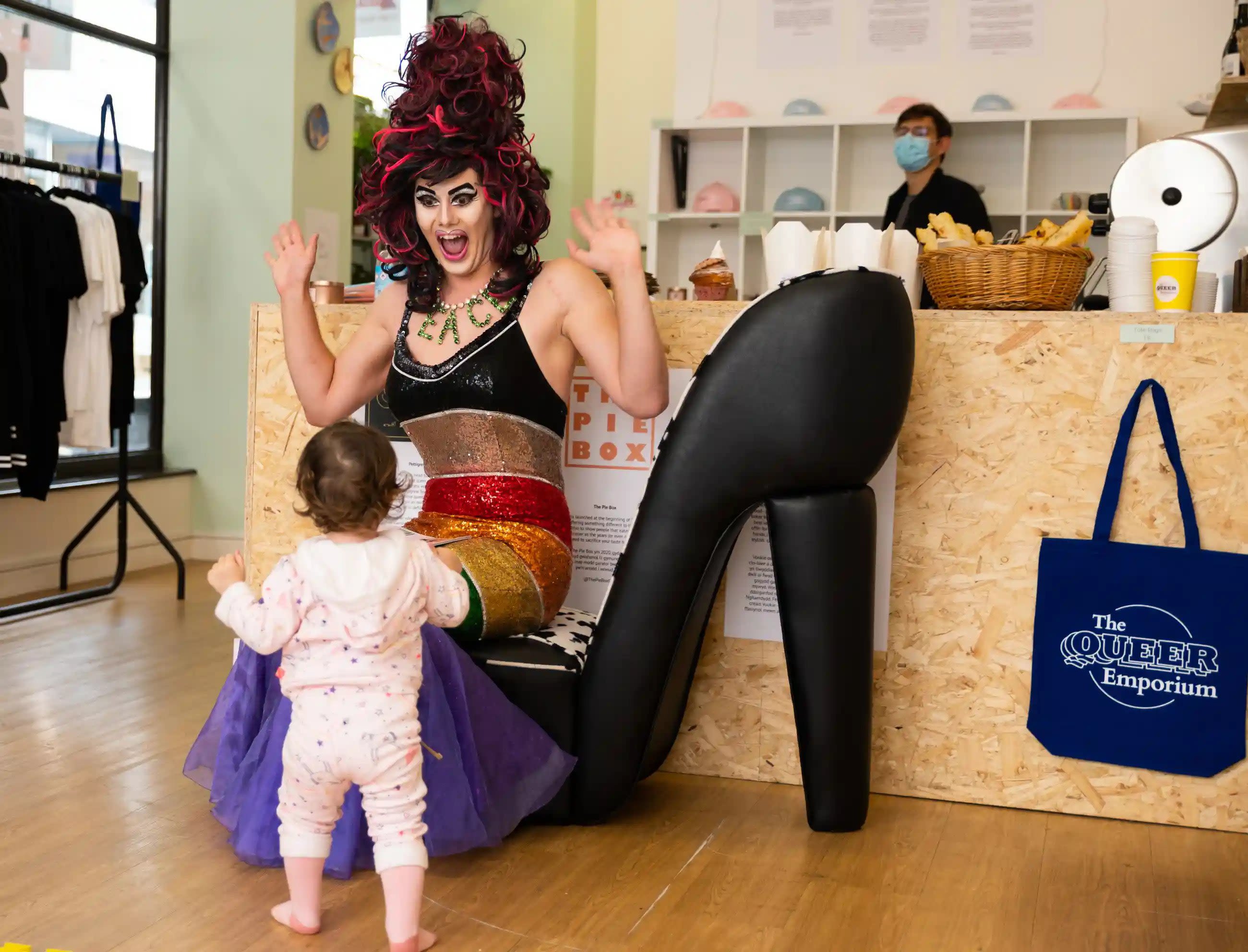
Sab Samuel, also known as Aida H Dee, engages with their audience during a story hour session. (Photo: Drag Queen Story Hour UK)
Sab Samuel, also known as Aida H Dee, engages with their audience during a story hour session. (Photo: Drag Queen Story Hour UK)
It raises questions about the sudden rise of hatred, considering the event has been around since 2017. They went as far as protesting a non-existent story event, when on March 10th, Turning Point UK stood outside an empty pub called The Great Exhibition in East Dulwich. Met Police officers were at the pub, where around 200 people were spotted outside.
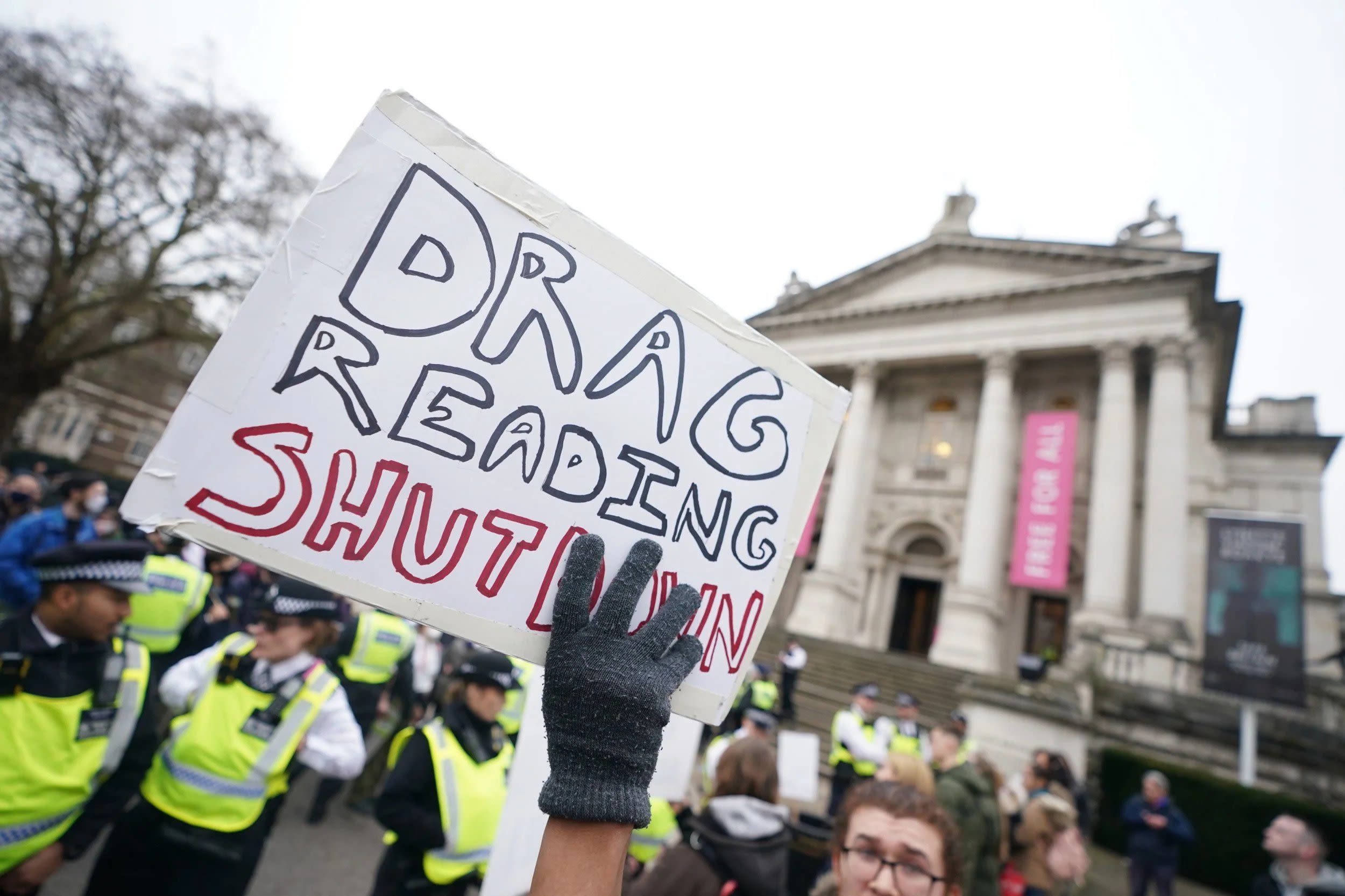
Why now?
Some believe that it is a product of an imported hate, all the way across the Atlantic. It started with the escalated hatred in the US, and it has since found a way to infect Great Britain. Just like how Turning Point UK is a branch of Turning Point USA, which is known for its strong support of former President Donald Trump on American campuses. Turning Point UK recently emerged and describes itself as a promoter of capitalism, free speech, and limited government.
In the US, Drag Story Hour has been around since 2015. They started as a small grassroots community group in San Fransisco by a transgender woman of colour that perform as a drag queen. In an interview with Jonathan Hamilt, executive director of Drag Story Hour, he explains that the DIY activism now has about 50 chapters in 45 states around the US. They also have presence in Canada, Australia, Berlin, Tokyo, Sweden and Mexico.
“Drag Story Hour is vital for children, because we are first and foremost a children’s literacy non-profit where we use the art of drag as a tool to convey diversity, equity, equality and tolerance. The younger kids (are able to) experience queerness and people that look and act different from them and come from different backgrounds and different walks of life. They’re going to grow up to be more well-adjusted, more kind, more accepting and (be) more compassionate humans.” says Hamilt, who is known for his drag persona, Ona Louise.
Hamilt discusses the ongoing controversy surrounding Drag Story Hour on Instagram. (Video: Instagram @ona.louise)
Hamilt discusses the ongoing controversy surrounding Drag Story Hour on Instagram. (Video: Instagram @ona.louise)
In a span of eight years, Hamilt has seen many changes and uplifting progress when it comes to the books they read, the curriculum and the teaching lessons.
“It’s increasingly hard to find children’s books that feature not white characters or characters that are either gender neutral or maybe non-binary. It’s interesting to find the book with like a character that has gay parents […] The world is a really diverse place and not every book has to be about the fact that they are different. It could be a totally separate matter and just accepting the fact that families look different from everybody.”
To Hamilt himself, doing story time as a drag queen is like wearing a tailored corset; a "perfect fit", as he likes to dress up but is not a big fan of nightlife. He grew up in the South in Georgia and moved to New York when he was 21. He started doing drag shortly after and now entering his 10th year.
"I’ve always done theatre in high school and college. Drag (to me) is theatre. It’s art. Drag was a really fun way for me to explore myself and to see different points of view. In New York City, drag is really big and there are lots of opportunities to be seen and be on stage. But I never really liked doing nightlife, so when I found out about story hour in San Francisco, I was like ‘oh, this is perfect!’. I love working with kids and the fact that I can do drag at 11 AM. And kids are super responsive to rich colours, sequins, and big hair."
The hate was nothing new to Hamilt and the Drag Story Hour team. They are used to having protesters outside the venues "just across the street, exercising their right for free speech". However, things turned worse after the Capitol riot, leading to extremist group Proud Boys invading drag queen events.
“Since then, these protests have turned into hate crimes, and these organised extremist groups were coming to our events, either having weapons or concealed weapons. Yelling homophobic or transphobic things. If we were pantomiming or doing clown-ing, Disney princess-ing, no one would have an issue with it. But the fact that drag lives in a queer space and a part of LGBTQ+ history and community, I think that’s where the problem is.”
The repressive circumstances have escalated to unimaginable heights with the passing of the Tennessee anti-drag bill, signed into law by Governor Bill Lee, leaving the drag and LGBTQ+ community reeling in shock and disbelief. On March 2, Lee signed a new law that criminalises certain types of drag performances. The law went into effect on April 1, 2023, and illegalise "adult cabaret entertainment" that is viewable by minors, including topless, go-go, exotic, and strip dancers, as well as male or female impersonators. Those who break the law will be charged with misdemeanours for their first offence, with subsequent offences being classified as felonies that could carry up to six years in prison.
“It's just a part of a larger conversation of homophobia and transphobia, and it’s never really been about drag queens. It's about eradicating and getting rid of tans and queer people together and trying to legislate us out of existence completely, and Drag Story Hour is a scapegoat and an easy target,” Hamilt continues.
“(It’s unusual) because drag has been in our culture for years. It's been in the movies; it’s been in Hollywood. The popularity of RuPaul’s Drag Race is really big, we have out and proud trans pop stars representation in media, so (drag) is nothing new. It’s just the tide has turned.”
The hate sneaked away and found Mama G, UK prominent pantomime dame who appeared in British Got Talent. Pantomime dames and drag queens share similarities: they strut the stage in larger-than-life personas, adorned with flamboyant costumes and makeup. They go against the grain of gender norms and societal expectations with a rich history that stretches across time and cultures. So, when the hate cupid missed the target, they went up to protest the Mama Goose.
“When people mistake me for a drag queen, I’m not offended at all because I think drag is wonderful. Recently, people have used the word ‘drag queen’ to describe what I do in a negative way. But, again, that’s an educational opportunity (to enlighten people),” says Robert Pearce, the man behind Mama G.
Pearce has been wrongly protested three times in 2022-2023. The first protest was in North Wales, ironically a part of the country that has a thriving pantomime scene. The librarian had to go out and explain to the protesters that the event was pantomime dame, yet they persist in protesting.
“The second one was a year later and was in Wembley, and again, London, big theatrical scene, panto everywhere. They were protesting specifically about the stories I was telling, and it was the same stories with the first protest. I tell stories about being who you want and loving who you are, and I think that’s actually where the problem has arisen, because I’m telling stories that are clearly LGBTQ+ friendly. When I was a kid, I didn’t hear these kinds of stories and it’s really important to see yourself represented in narratives,” says Pearce, who pursued American theatre arts in college and completed their theatre studies at Stephen F. Austin State University in Texas.
“I’m not going to stop telling any of those stories because they are evidence that people need to hear them. I think it’s really important for kids to hear stories that have diverse characters, so that, however they grow up and choose to identify, they understand that everybody is different, diverse people exist in the world, and that everyone is worthy of respect and love.”
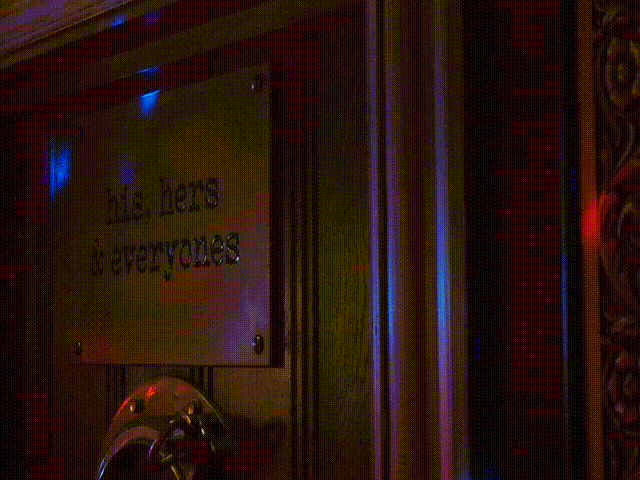
We try to unravel the reasons for the escalating hate.
According to Justin Ellis, senior lecturer in Criminology in The University of Newcastle, Australia, the hate towards Drag Queen Story Hour is solid evidence of the benefits and risks of social media. As drag queens become more "visible", they are also becoming more vulnerable, as the line between virtual and physical reality can blur when it comes to online abuse — which may manifest in the form of hate crimes that spill over into the real world.
“There’s research in England and Wales that shows that there’s a relationship between online hate and in person attacks. We also have research that shows it happens the other way around. In one case in the US, a member of Infowars and Alt Right provoked a drag queen performer. They docked that drag performer, asked them their real name. The drag queen provided their real name. And then the Infowars person upload that video onto their website and people started digging up their personal information and spread it,” says Ellis.
Ellis wrote a journal explaining how the controversy surrounding Drag Queen Storytime events coincided with a rise in reported hate crimes in the United States and England and Wales between 2018 and 2020. His research results highlight how bias-driven hate behaviour is fuelled by medical and legal stigmatisation of same-sex attraction and gender fluidity, along with pseudo-scientific beliefs.
“I think what we’re seeing right now is – Boland wrote about this in the 1990s – a sexual emergency. These people are uncomfortable, not necessarily with Drag Story Time or gender diversity and sexual orientation diversity, but because they now have more visibility. They have more rights, more cultural legitimacy, and some people see that as a threat and a minimisation of their own cultural primacy. (It’s mostly) groups like extremist Christian or right-wing groups in the US that have now been declared as terrorist organisations.”
Ellis called the phenomenon as "the hate feedback loop".
"For example, a belief that anyone who is same-sex attracted is a potential child groomer, and we have to mitigate those misconceptions. This wave of legislation in the United States, led by Tennessee, has raised significant concerns. I think the big issues are going to be, and often for the trans people. It's about moral panic. It's about what you look like. It's about where you are, who you are, and what you're doing at a certain point in time. And this criminalisation is a real risk to trans people."
“The big problem to me is the retreat of people from the public sphere, the retreat of safe debate. It's okay to protest, but don’t make it violent. We had a case in Sydney recently where there was a group of LGBTQ+ protesters and then all of a sudden there’s this massive group throwing rocks and bottles. Civilians and even the police were injured.”
“We need to get back to having reasoned, peaceful debate.
We need to bring back the principle of peaceful
protest and constructive debate.”
Whilst the hate towards Drag Queen Story Hour and the discrimination against the community are still an ongoing battle, drag queens are also struggling to make ends meet with the rising cost of living, particularly as RuPaul's Drag Race's popularity influences public expectations. It does not stop there. The escalating cost compelled venues to broaden their audience, consequently altering the landscape towards a more mainstream dynamic, resulting in ‘aggressive behaviour’ within their safe-space.
Pretty Pricey
Drag queens on cost of living, the multifaceted impact of RuPaul's Drag Race and the price of safe space
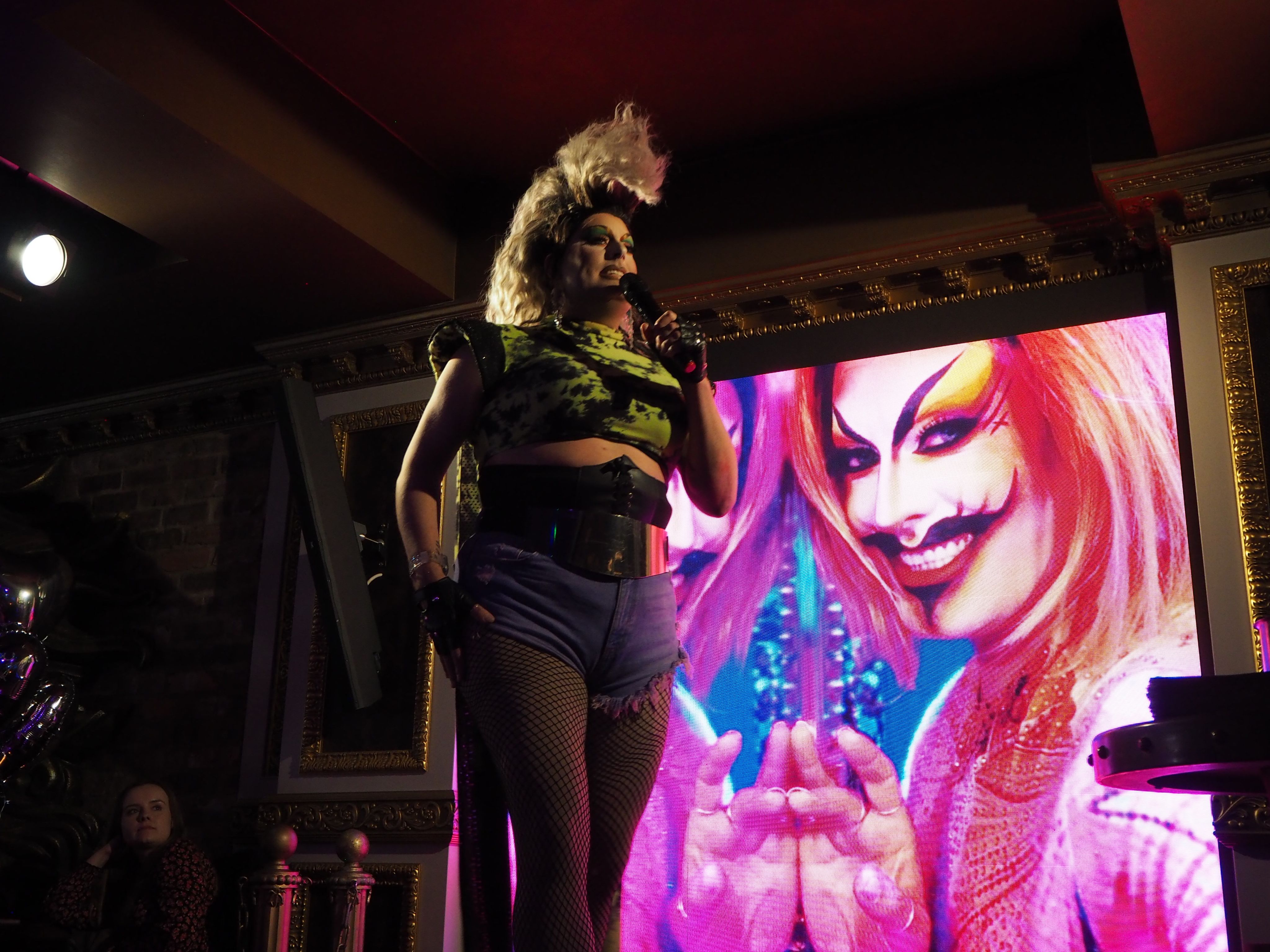
Smith introduced Daniella Queen to the world when they were 18 years old, unleashing their young drag persona on a small stage in a gay bar in Bournemouth called DYMK – an abbreviation for Does Your Mother Know? And Smith’s Mum does know. She might be a person of few words, but she knows Smith has always shine the best when they were on stage since they were a theatre kid. So, when 17-year-old Smith turned to her and said that they wanted to do drag, she only said four words: “Get in the car.”
“She took me to loads of different shops just so she could buy me my first makeup kit, my first wig, my first dress and my first heels. I worship my Mum. She has been my biggest supporter. She pays for my drag, she’ll drive me across the country if I need to... I’m so glad to have at least one parent who really supports what I do and has my back from the very get go,” says Smith, with eyes brimming with overwhelming gratitude.
But then, the pandemic hits. Smith had to cultivate and refine Daniella from the front yard of their home. They were lip-syncing and dancing in with luxe makeup, glittering dress, striking wig and eight-inch heels, all live-streamed with the neighbours watching. One of them put a degrading post about their 'activities’ on the neighbours’ Facebook group, which Smith claimed was ‘hilarious’.
It was a long time until they finally landed a paid gig. Whilst the pandemic effect is still lingering, the cost of living crisis threw a spanner in the works of Daniella's career.
“End of last year, I was meant to do a gig in Manchester. It was for this really big company that I literally was super psyched for. Two or three days before the show, they cancelled because the cost of living affected everyone, and they couldn’t buy tickets. And we’re still waiting to reorganise the show and it’s been five months now. It really, really hurts because I was so excited,” Smith says with a mournful look.
No performance, no money. Smith and their drag sisters had to wrestle with the crisis as more places are turning down, halting or reducing drag performances. Smith and their Mum now live solely from government benefits. After leaving her ‘emotionally harmful’ husband, Smith’s Mum worked as a bus driver, but then her lungs deteriorated. Smith knew they had to wiggle their way to escalate Daniella’s look and stage act.
“I’m starting to work with cheaper fabrics or unconventional materials for my makeup, outfits and jewellery. I remember I made an entire necklace out of quality wrappers, and I used some sort of metallic foil. I use them to create different colours and it creates this stained-glass effect, like the ones in church. Bellissima, bellissima!”
Only recently, Smith secured gig at Walkabout that will get them £150 per performance. They also landed a monthly gig at Be At One that will pay them around £250-£300. But how much does Daniella ‘worth’?
For a dance performance, Daniella would wear her fringe outfits that vary from £40 to £120. Wigs are £70, but if it was her styled wigs then it would be £150. There will be at least £300 worth of makeup that goes on her face every time from all sorts of different brands.
“I’d say all in all, when you’re seeing me performing, you’re seeing at least £500 worth of drag on my body. If we were talking about my whole wardrobe, I spent at least over £10,000 in my entire four years of doing drag.”
The rising cost of living has been a real challenge for experienced drag queens as well. Le Fil, a seventh-place finisher from last year's Drag Race UK, says that drag shows are now less in demand, in which gigs are becoming fewer and less well-paid. He mentions that as a drag artist, all expenses come out of the same money pot, including costumes, photography, graphics, and transport.
Bailey J Mills, says that although they prefer the entertainment factor of drag to the look, they face pressure to provide for their soon-to-be-born child. They say that their bookings have slowed down and that they have had to limit the number of gigs they take in London because of transport costs.
The answer to what prompts these performers to have queen-sized budget for their appearances, lies in the mounting public expectations fuelled by the widespread fame of RuPaul's Drag Race.
"We’re looking for Great Britain’s Next Superstar,
don’t waste my time. I don’t wanna see any f*cking H&M!"
RuPaul’s sudden burst was aired on 11 February 2021 and instantly went viral. It was all because Joe Black, a drag queen from Brighton, wore a belted pink velvet dress from H&M on the runway challenge. Some viewers found it amusing and made memes out of the situation. But the rest of the audience, the other contestants and of course Joe Black himself, felt like RuPaul’s comment was ‘insensitive’ and solidifies the notion that queens are not doing drag ‘properly’ if they are wearing something simple and affordable. Especially in times when the show was shot.
Jack Black's H&M dress that got him eliminated from RuPaul's Drag Race.
The season two of RuPaul Drag Race UK was filmed in March 2020 and was halted due to the pandemic lockdown. The production took a hiatus for a period of seven months and drag queens couldn't work as much because of the restrictions, which ended up with a bunch of drag spots shutting down and shows being cancelled. Joe Black admitted in an interview that during the seven-month break, he was unsure if he could return to the competition, He had to sell many of his wardrobe in order to make ends meet, turned to hosting online events, and borrowing costumes for the runway appearances.
This just hammers home the point that for a drag queen to be pretty, especially RuPaul kind of pretty, is pricey. Quite demanding, considering that the winner of the UK Drag Race didn't even win any cash prize. All they received for their hard-fought victory was the title of 'UK's Next Drag Superstar', a chance to feature in their own digital series crafted by the makers of RuPaul's Drag Race, a sceptre and a crown. The cost of the crown, just getting steeper and steeper.
The influence of this is pervasive, shaping the perspective of up-and-coming drag queens like Oliver Thompson, 22, on what they need to do to steal the audience's heart.
Thompson is a newcomer in the Bournemouth queendom. They just started drag four years ago with the stage name Dickie Beaux, and now working their way up along with his drag sister, Smith, doing gigs together in local venues like Walkabout and Be At One. They agreed that RuPaul’s Drag Race has done wonders to the drag world. However, to them, the standard has been elevated so high. They feel the need to buy a costume that worth almost their one month rent whilst working their day job at Co-Op.
“If you look at up to at least season 6 in the US, they were coming in with like frocks from Primark, you know they were and they looked great! Season 7? Because of the winner, Violet Chachki, Miss Fame and Power, they were all like models! They were all like statues! And they raised the bar so high. I bought a wig last week for St. Patrick’s Day, that m**********r cost me £160 without postage. I had a black and white pinstripe suit that I wore to an event last year and that was £300. I’ve got a costume that literally worth a third of my rent!”
Violet Chachki is the winner of season 7 RuPaul's Drag Race US.
The seasoned drag queen have a say...
Meanwhile, the landscape of starting drag has transformed over time. In the past, without commercialised influences like RuPaul's Drag Race, queens had to navigate their journey independently, forging their own paths. Drag was less accessible then, and artists perhaps had a ‘purer connection’ to their craft.
Christopher Garner has been a drag queen for 10 years now. He used to work at Mu Mu in Maidstone, Kent, as a manager, before one Halloween night changed his course, and gave birth to who's later became a legendary drag queen widely recognised by everyone in Maidstone -- The Madame. She would introduce herself with her full name at the beginning of her show at full speed: The Madame bomb badame sticky adam fried fadame ay-kay-ay.
Garner thinks, younger queens might not know about the expenses they have to pay when they slip into the wonderland. Garner also discusses the over-saturation of the drag market due to the influence of the reality-competition show, which has significant implications for drag queens' professional prospects.
Bottoms Up, Costs Up
The cost of living hardships stretched beyond the drag queens to encompass the venues that hosted them, including prominent spots in urban areas like London. One of them is The Glory. The East Ender venue continues to deal with the pandemic's impacts while also facing the cost of living crisis, as co-owner John Nolan remarks.
“Everything has been getting more expensive. Because obviously the pandemic caused problems with other companies. They have to pass on some of that debt to their customers. So, everyone started increasing their prices and this obviously was going on. It was like the Brexit effect. Then the pandemic had an effect and they created this new cost of living crisis.”
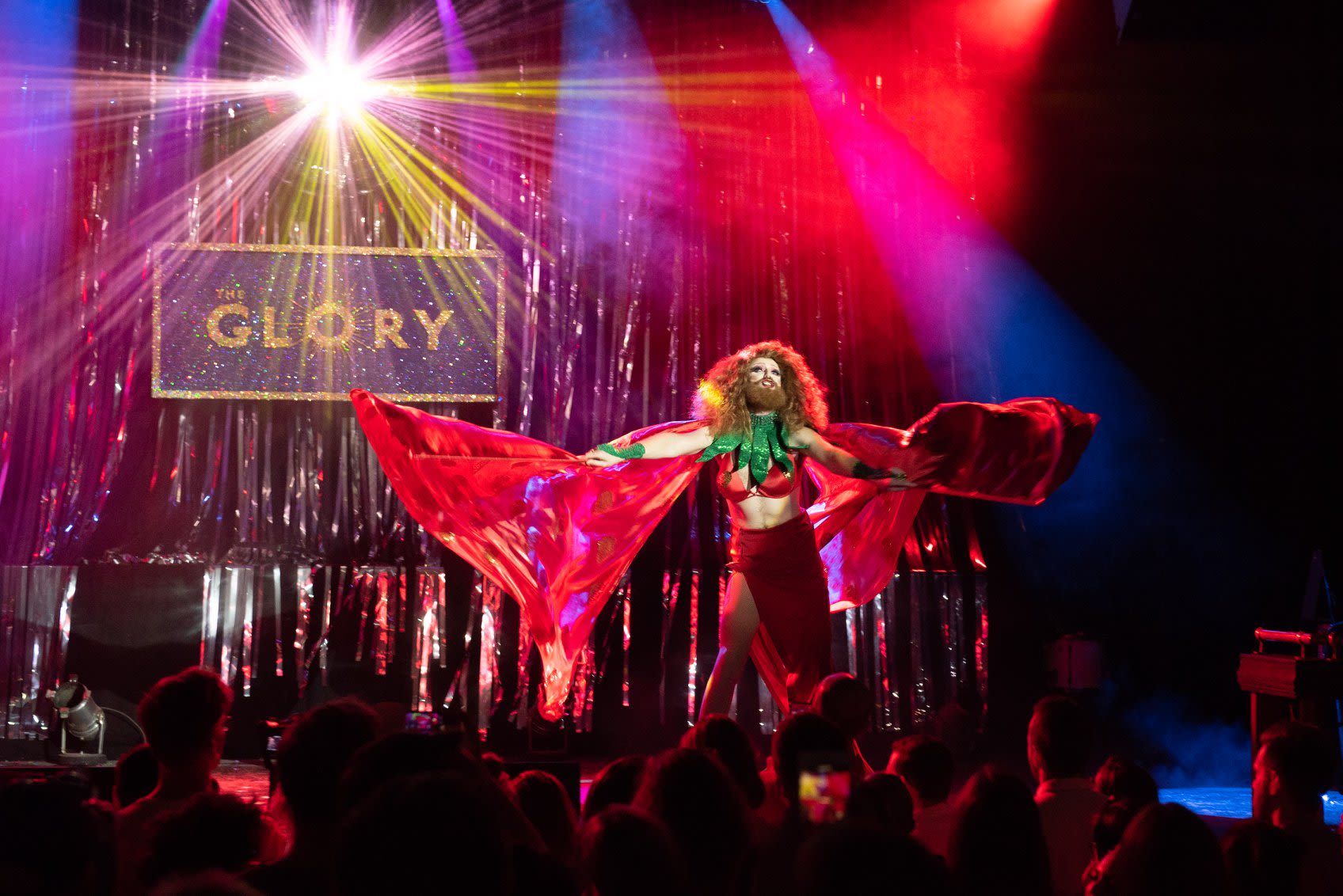
The Glory regularly hosts cabaret nights that highlight a range of acts, including burlesque, live music, circus performances, and spoken word poetry. (Photo: The Glory)
The Glory regularly hosts cabaret nights that highlight a range of acts, including burlesque, live music, circus performances, and spoken word poetry. (Photo: The Glory)
The Office for National Statistics (ONS) latest report shows that inflation rose to 4.2% in October 2021, the highest level in ten years, with rising energy prices and supply chain issues contributing to the increase. The report suggests that due to inflation and rising prices, people's ability to purchase goods and services is decreasing.
In March 2022, a whopping 87% of adults reported that they've been feeling the pinch compared to just 62% back in November 2021 -- which means that they have felt a 25% increase. In addition, around 23% of adults said it was tough to keep up with household expenses. About 43% of adults don't think they'll be able to save money over the next year. Even before the present situation, LGBTQ+ safe spaces and historic nightlife venues have encountered challenges, where in London alone, 73 gay venues shut down from 2006 to 2017, leaving only 53 remaining.
The pandemic also took its toll on The Karaoke Hole, another drag hot spot in London. The challenges were particularly difficult for David Hunter, who, as the programming and marketing director, was responsible for informing performers of cancelled bookings. After the pandemic, Hunter claimed that there has been a "real bounce back". But Hunter did not deny that the cost of living crisis has inflicted significant repercussions on the drag queens, as he saw an increase in drag queens actively seeking out work at The Karaoke Hole to cover their living expenses.
"We have a varying pay rate depending on the night, but for Fridays and Saturdays, we increased our pay rate from £150 to £175 for a 3.5-hour hosting set at the start of this year. It's not a huge increase, but it was important for us to show that we understand the cost of living crisis and are committed to paying our performers fairly. We didn't just randomly pick a number; it's what we can afford based on audience spending. For midweek shows, we pay £40 an hour, recognising that we tend to finish earlier and have lower audience attendance."
Even small towns such as Bath have not been immune to the burden of higher costs of living. With only two other gay bars in Bath, Mandalyns has been a popular spot for students and the local police. However, the financial strains of the pandemic and the current cost of living crisis have forced the bar to reduce their show called Drag Queen Cabaret, causing heartbreak among drag performers.
“What we've done is we've moved it (drag performance), so it's just once a month now as opposed to twice or three times a month, which helps customers because obviously they can't afford to come out every single week. Likewise, we can't afford to pay drag queens fees every single week. But, by making it once a month, it makes it more special events for people to come out with their friends, etc. And they know when it's going to be,” said Mark Maidment, resident drag queen of Mandalyns. The 49-year-old has been working in the Mandalyns since 2007 and known professionally as Phillupa Bucket.
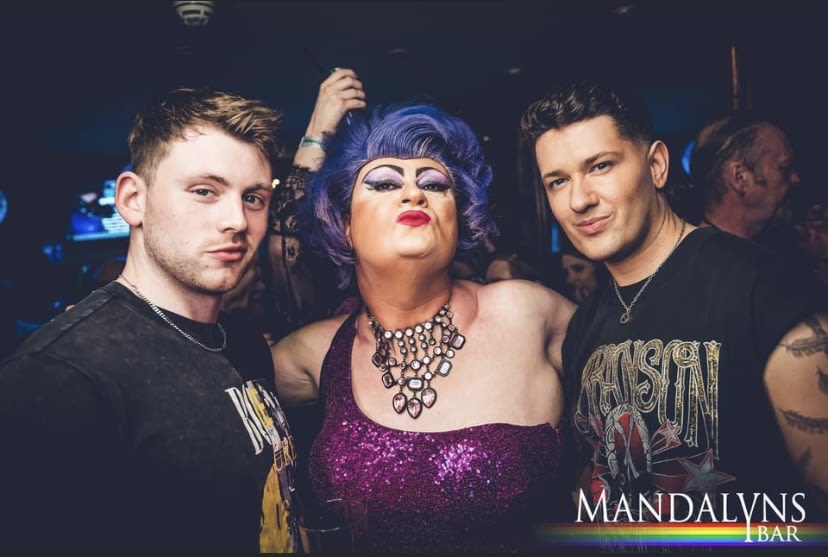
Mark Maidment, also known as Phillupa Bucket, has been in the drag industry for 18 years. The current situation that Mandalyns is facing is not ideal, but Maidment believes that drag will persevere even in the toughest times. (Photo: Personal document)
Mark Maidment, also known as Phillupa Bucket, has been in the drag industry for 18 years. The current situation that Mandalyns is facing is not ideal, but Maidment believes that drag will persevere even in the toughest times. (Photo: Personal document)
In Bournemouth, the surging expenses forced venues to promote free events. For Smith and Thompson, these events are rookie’s gold mine to gain recognition – even contract deals. However, the availability of free events opens the floodgates for anyone to enter their space.
The Unsafe Space
Undoubtedly, RuPaul's Drag Race has made drag more popular and visible than ever before, attracting a whole new generation of fans who might not have discovered it otherwise. But it acts as a double-edged sword: Whilst this recognition is fantastic for the visibility of drag community, it can sometimes lead people to have misguided expectations of what a real life, non-RuPaulified drag performance should be like.
“A lot of them are expecting a lot of splits, dancing and lip sync (like what they do on RuPaul’s Drag Race). There is a difference in the audience in East London, and not many performers want to just do a straight lip-sync song and do a few little sassy bits that people expected. A lot of it is from the heart and what they want to do. When it is this sort of crowd that is just very much hung culture, it can be very harmful for a performer's identity because you're expected to be a certain way. I've experienced it a lot with the events last year,” says Michael Hall aka Bonk, a 21-year-old London’s newcomer queen who introduced themselves as ‘Maximalist Hot Little Oink Hog’.
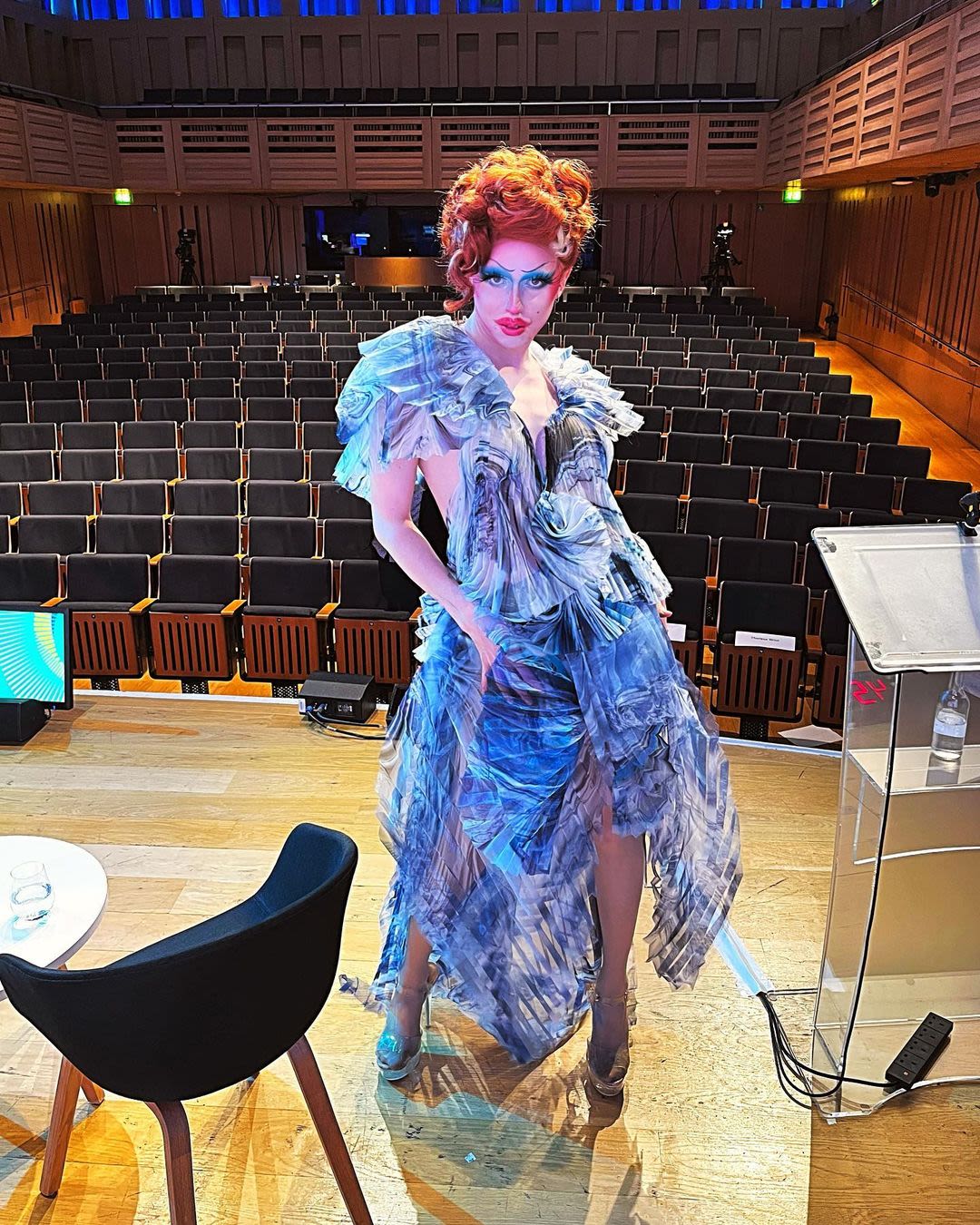
Michael Hall aka Bonk performing for Meta panel talk on late September 2022. (Photo: Personal document).
Michael Hall aka Bonk performing for Meta panel talk on late September 2022. (Photo: Personal document).
Suddenly, the hate invades their safe space.
That evening was supposed to be a routine performance for Sean Eccleston, known by the stage name Dawn the Drag Queen. Having started doing drag in 2019, it marked the first instance of an upsetting occurrence happening to him, despite his regular gig that goes at least four times a week.
“During an event, there was a guy in the audience who was being very transphobic towards someone I knew. I called him out and told him to leave, but he continued to be aggressive. I walked to the back of the bar and spoke to the owners about it, and as I walked back to the stage, the guy threw a pint at me. It was an interesting moment, but I had a job to do, and people had come to watch me, so I had to carry on,” says Eccleston, his voice shaking with emotion.
“Unfortunately, incidents like this happen every day. As a minority, it comes with the package, but it shouldn't be that way. We are taught to deal with it personally, to cope with it, and to stand up against it. Racism, homophobia, and transphobia will always be present, but it's up to us as individuals and as a community to deal with it,” the trans-male Southampton and London based queen adds.
Daniel Baxter, senior lecturer in Glasgow Caledonian University who is also a drag enthusiast, tries to explain it on his journal Dragging Up the Night. His findings shows that RuPaul's Drag Race not only costs the drag scene a narrowing public perception of what drag is, but it also attracts wider, straighter audiences into a scene that used to be an exclusive safe space for LGBTQ+.
Baxter’s respondents described the drag race fan base for being toxic, judgmental, and harmful to non-binary and trans performers. They have "high expectations" and "very judgemental" towards drag queens, even though they are not part of the competition, and impacting performers' mental health and careers.
His research also found that 60% of the attendees at these events are women, with 50% classifying as straight, highlighting that the audience is now broader and more diverse. He mentioned that drag was first intended to be a creative outlet for gay men only, and not for the wider LGBTQ+ community or mainstream society. Its purpose was to challenge societal norms surrounding gender, sexuality and politics through artistic expression.
“The true essence and origin of drag can sometimes get lost when you bring in new audiences. They see it for how it’s being portrayed in the mainstream, but don’t always view it from the perception of how important it has been in pushing forward the LGBTQ+ agenda, communicating the challenges within society that is questioning the barriers of gender, sexuality, politics," says Baxter.
“These audiences that are new to these shows, are new to the phenomenon and they don’t know how to act. They see it as a novelty. They see it as the artist is there for them, and they can take over and act inappropriately to the drag queens, and we found out from the study that we carried out.”
Yet Eccleston is unfazed, even with the changing scene and continuous backlash. He believes that there is no better time than now for drag community to be fiercer, prouder than before.
“It's important to teach younger generations that it's not okay to hold derogatory views towards others. We should stand up for what's right, and if we see someone being abused, we should intervene and make them understand that it's wrong.” (*)
Special thanks to all sources:
Danny Smith/Daniella Queen
Christopher Garner/The Madame
Chris Ashton
Daniel Baxter
Justin Ellis
Sean Eccleston/Dawn the Drag Queen
Jonathan Hamilt/Ona Louise
Robert Pearce/Mama G
Mark Maidment/Phillupa Bucket
Michael Hall/Bonk
Oliver Thompson/Dickie Beaux
John Nolan
David Hunter
Venues:
Be At One, Bournemouth
Mu Mu, Maidstone, Kent
